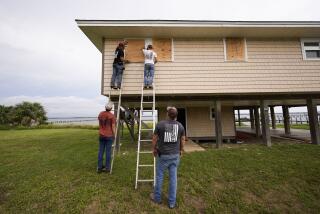Togo’s Leader Agrees to Quit
The African Union suspended Togo on Friday, increasing pressure on the tiny West African country for a democratic solution to its leadership crisis and perhaps pushing the era of the “big man” in African politics nearer to a close.
The pan-African organization, meeting in Addis Ababa, the Ethiopian capital, also voted to impose sanctions on Togo, isolating the country nearly three weeks after the sudden death of President Gnassingbe Eyadema and the military’s installation of his son as successor.
Late Friday, Faure Gnassingbe announced on state-run media that he would step aside and run for the office in two months. It was unclear whether that would lead to free elections, or whether his statement would satisfy the African Union.
After Eyadema died of a heart attack en route to France for medical treatment, the army named his son president and the constitution was quickly amended so Gnassingbe could serve out his father’s term, until 2008. When demonstrators protested, the soldiers fired on them, killing several.
Eyadema was Africa’s longest-serving ruler. He staged a military coup in 1967 and remained in power 38 years, crushing all opposition and dissent. None of the elections he held were judged by international observers to be free and fair.
The ruler’s death offered a brief window of hope for change in the former French colony, where about 70% of the 5 million people live on less than a dollar a day. But within hours, the military installed his son, ignoring a constitutional provision that the head of the national assembly should act as president until elections are held in 60 days.
The seizure of power was criticized by U.N. Secretary-General Kofi Annan and the European Union, which suspended aid to Togo a decade ago. The U.S. State Department called on the new ruler to relinquish power.
Analysts said the African Union’s move Friday was a clear break from the past, when leaders tolerated “big man” dictators and despots as neighbors, and power changed hands through military coups more often than through the ballot box.
Led by Nigerian President Olusegun Obasanjo, the 53-member AU condemned Gnassingbe’s taking of office as a coup. The Economic Community of West African States also imposed an arms embargo and other sanctions.
Jakkie Cilliers, director of the Institute for Security Studies in Pretoria, South Africa, said he believed the pressure from Africa, particularly Nigeria, was so strong that there was a significant chance that Gnassingbe would be forced out.
“There are important changes happening in Africa with regard to how Africans see and govern themselves. It’s another reaffirmation of those new winds blowing across the continent,” Cilliers said, citing the contrast from the way the African Union and its predecessor, the Organization of African Unity, handled such issues in the past.
“What the AU is doing is setting a clear precedent for future action,” he said.
The OAU was formed in 1963 to promote good governance and social progress in Africa, but it was largely ineffective for decades. Things started changing in 1999.
“We have seen a steady change in the nature of African engagement in terms of unconstitutional changes in government. Over the last six years we have seen a steady progression in African leaders taking a much firmer line against actions which are considered unconstitutional,” Cilliers said. “But it’s also reflected in the greater sense of African ownership of Africa’s own responsibilities for good governance.”
Poor, lacking in influence and short on friends, Togo makes an easy target in Africa’s tougher strategy on democracy and good governance. The African Union’s response contrasts with its stance on Zimbabwe, which was recently described by U.S. Secretary of State Condoleezza Rice as an outpost of tyranny.
“No doubt it’s much easier to deal with a country such as Togo than with a country such as Zimbabwe, where we see the African Union not playing any role at all,” Cilliers said.
Zimbabwe’s president, Robert Mugabe, has been criticized for closing newspapers, pressuring journalists, manipulating elections and denying food aid to opposition strongholds.
But Cilliers argued that despite its silence on Zimbabwe, the AU had taken a stance in other areas. For example, it criticized Sudan over the crisis in Darfur, where at least 2 million people have fled government-backed militias who attacked and burned hundreds of villages.
More to Read
Sign up for Essential California
The most important California stories and recommendations in your inbox every morning.
You may occasionally receive promotional content from the Los Angeles Times.










